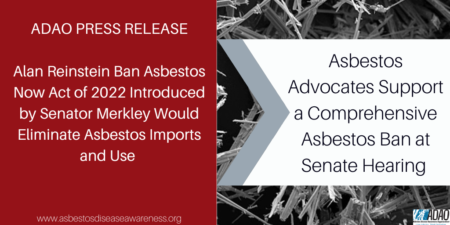FOR IMMEDIATE RELEASE
June 9, 2022
Asbestos Advocates Support a Comprehensive Asbestos Ban at Senate Hearing
Alan Reinstein Ban Asbestos Now Act of 2022 Introduced by Senator Merkley Would Eliminate Asbestos Imports and Use
 WASHINGTON, DC — The Asbestos Disease Awareness Organization (ADAO), the largest nonprofit dedicated to preventing asbestos caused-diseases, testified today before the U.S. Senate Committee on Environment and Public Works in support of S. 4244, the Alan Reinstein Ban Asbestos Now Act of 2022 (ARBAN), introduced by Senator Merkley.
WASHINGTON, DC — The Asbestos Disease Awareness Organization (ADAO), the largest nonprofit dedicated to preventing asbestos caused-diseases, testified today before the U.S. Senate Committee on Environment and Public Works in support of S. 4244, the Alan Reinstein Ban Asbestos Now Act of 2022 (ARBAN), introduced by Senator Merkley.
“We need a swift legislative solution to end the unnecessary death and disease caused by asbestos in the United States,” said Linda Reinstein, President and Co-founder of ADAO. “Over one million Americans have died since 1991, when the United States tried, but failed, to ban asbestos. We have known for nearly a century that asbestos is a deadly carcinogen that causes lung cancer, mesothelioma, cancers of the lung, larynx, and ovaries, and asbestosis. There is no safe or controlled use. It’s time for the US to join nearly 70 other countries and ban asbestos once and for all.”
The Alan Reinstein Ban Asbestos Now Act (S. 4244, H.R. 7810) will:
- Prohibit the importation and commercial use of all six asbestos fibers (chrysotile, crocidolite (riebeckite), amosite (cummingtonite-grunerite), anthophyllite, tremolite, and actinolite, as well as Libby Amphibole, winchite, and richerite.
- Transition plants in the chlor-alkali industry using asbestos diaphragms to non-asbestos technology within two years.
- Establish mandatory asbestos reporting obligations for companies importing and using asbestos.
- Develop an educational outreach program to support full compliance with ARBAN.
The chlor-alkali industry is the sole importer and user of raw asbestos. Only three U.S. companies, Olin Corporation, Occidental Chemical Corporation and Westlake Chemical Corporation, use asbestos diaphragms at eight plants. The other 18 companies have invested in innovative and efficient alternatives. The Environmental Protection Agency (EPA) has determined that asbestos use by this industry presents an unreasonable risk to the health of workers.
Reinstein said that “industry’s dependance on asbestos is simply outdated and unnecessary. It is not about if the chlor-alkali should transition from asbestos diaphragms to an alternative process, but when.”
According to EPA’s economic analysis, elimination of all remaining asbestos use in the industry is not only feasible but will have economic and environmental benefits.
“It’s time to stop the fear-mongering around the impact of a phaseout on the availability of chlorine and caustic soda for water treatment,” stated Reinstein. “This is a minor use that represents less than seven percent of chlorine production and the industry can easily prioritize meeting the needs of the water sector as it has in other nations around the world with an asbestos ban”
“We strongly encourage members of Congress, the industry and stakeholders to develop an asbestos diaphragm phase-out schedule that is expeditious, implementable and puts public health first,” Reinstein emphasized.
ADAO recognizes that EPA’s work on asbestos under TSCA is a strong step forward but legislation is needed because the EPA proposal would only ban one fiber, chrysotile asbestos, for only six conditions of use. There are five other deadly fibers and many more conditions of use that must be banned to truly protect the public from asbestos.
As an act of Congress, ARBAN will also avoid time-consuming and unproductive litigation over the Environmental Protection Agency’s pending rulemaking and prevent delays in protecting Americans at risk from asbestos exposure. “We urge Congress to swiftly pass this legislation and send it on to President Biden, where it can be signed into law and start saving lives,” concluded Reinstein.
Early ARBAN supporters include: Asbestos Disease Awareness Organization (ADAO), American Public Health Association (APHA), International Association of Firefighters (IAFF), Environmental Protection Network (EPN), Safer Chemicals, Healthy Families (SCHF), United States Public Interest Research Group (PIRG), Center for Environmental Health (CEH), Natural Resources Defense Council (NRDC) Environmental Working Group (EWG), Collegium Ramazzini, Environmental Information Association (EIA), Hazards Campaign (UK), Less Cancer, and Brazilian Association of People Exposed to Asbestos (ABREA).
###
